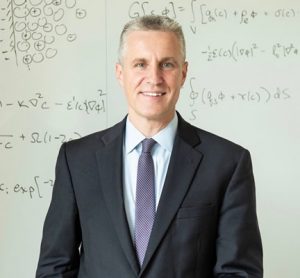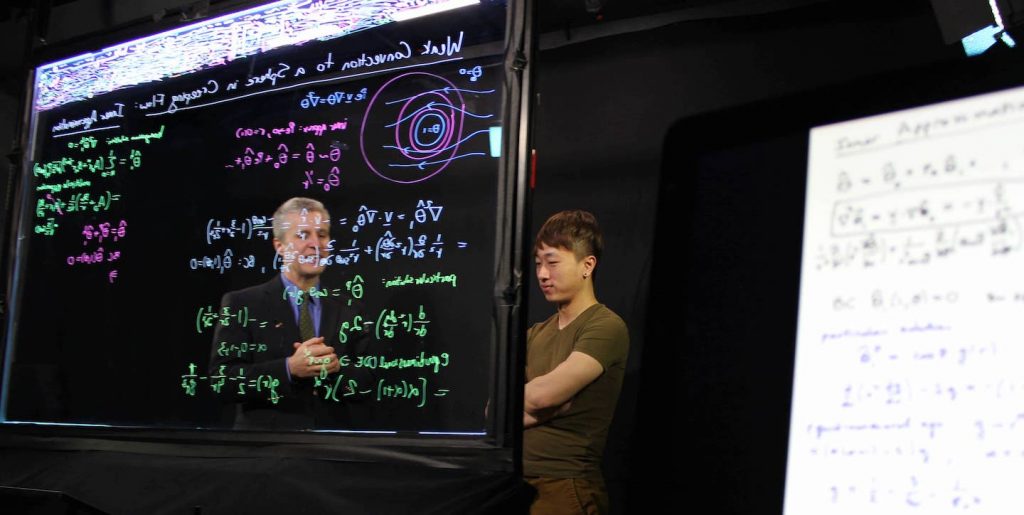New online course represents the most advanced, graduate-level subject in engineering or applied mathematics available today on edX.
 The MIT Chemical Engineering Department introduces its new MOOC Analysis of Transport Phenomena II: Applications (10.50.2x). This course is a follow-up to Analysis of Transport Phenomena I: Mathematical Methods (10.50.1x), which launched in 2018.
The MIT Chemical Engineering Department introduces its new MOOC Analysis of Transport Phenomena II: Applications (10.50.2x). This course is a follow-up to Analysis of Transport Phenomena I: Mathematical Methods (10.50.1x), which launched in 2018.
“Students in this online course learn to formulate continuum models of heat and mass transfer and solve them analytically,” explains instructor Martin Bazant, the E.G. Roos Professor of Chemical Engineering and the Department’s first Digital Learning Officer. “Even in the age of computers, such equations and solutions play a crucial role in the design of engineering systems and our understanding of their operating principles.”
With this new MOOC, Bazant has successfully created a “digital textbook” for the seminal chemical engineering graduate course 10.50 Analysis of Transport Phenomena.
“Course 10.50 is a challenging rite of passage for all PhD students in chemical engineering and attracts students from other science and engineering departments. They learn a unified treatment of heat transfer, mass transfer, and fluid mechanics, emphasizing scaling concepts in formulating models and analytical methods for obtaining solutions. These concepts apply to an array of modern day challenges, for example, the design of a lithium ion car battery with safe charging and long cycle life.”
Designing a MOOC that successfully covers this material was a challenge, as most problems in the course involve long calculations, which can be difficult to teach and also assess online. To solve this, Bazant implemented “scaffolding” – breaking up problems into smaller parts – and included tips and tutorials to help learners solve each problem while maintaining the rigorous intellectual challenge. His LightBoard lecture videos, along with interactive examples, allows students to visualize, as well as actually see, each mathematical concept. Previous course participants have included a diverse group of college students, industry professionals, and faculty from other universities in many science and engineering disciplines across the globe.
In 2019, Bazant earned the MITx prize for his teaching innovations in the 10.50.1x course and was a finalist for the edX Prize. The MITx prize is given to educators who have developed MOOCs that share the best of MIT knowledge and perspectives with learners around the world. The course 10.50.1x was truly innovative in teaching such advanced material in a MOOC format. Participants of the new MOOC have said it was “one of the best learning experiences that I have had in my life,” “of the highest quality in terms of contents, videos, homework and their execution,” and that “this course was mind-opening and makes me see the world differently.” One student has “applied the concepts to my own research”, while another stated, “although I earned a certificate, I may take it again.”
Digital Learning in the Department
 As MIT Chemical Engineering’s first Digital Learning Officer, Bazant has helped to direct the Department’s prioritization of digital learning. Working closely with Joey Gu PhD ’19, the Department’s first Digital Learning Fellow, Bazant is guiding the development of a variety of MOOCs and residential teaching tools by other faculty.
As MIT Chemical Engineering’s first Digital Learning Officer, Bazant has helped to direct the Department’s prioritization of digital learning. Working closely with Joey Gu PhD ’19, the Department’s first Digital Learning Fellow, Bazant is guiding the development of a variety of MOOCs and residential teaching tools by other faculty.
“We’ve really seen an exponential growth in faculty interest in digital learning in Chemical Engineering over the last few years,” explains Gu, who received his PhD from the Department in 2019, focusing on models of multiphase flow in porous media, “In addition to Prof. Bazant’s MOOCs 10.50.1x, 10.50.2x, and 10.S95x, I’ve also worked with faculty to create digital learning content in our residential courses, which we are also looking to bring to the global edX audience in the future.
“Each MOOC or residential course has its unique set of challenges, but it’s always exciting to design digital instructional tools for effective learning. The key is to understand the different needs of the target learners and to apply research-based teaching practices when casting learning material in the digital format. Examples of our recent and current work include a “Math Boot Camp for Engineers”, the undergraduate thermodynamics course 10.213, and a project management course for the Practice School.”
Bazant has also created a self-paced MOOC Physics of COVID-19 Transmission (10.S95x), which discusses the scientific principles behind the airborne transmission of COVID-19, and how a quantitative safety guideline may be derived to assess the risk of transmission. This self-paced MOOC, launched in December 2020, has already had around 3,500 enrolled students. Participants have called it “extremely enlightening,” “very clear and remarkably well-organized,” and “very helpful in understanding the whole situation more.”
About Martin Bazant
Martin Bazant is a leader in electrochemical systems, electrokinetics, and applied mathematics. In the area of electrokinetic flows, he predicted nonlinear electro-osmotic flows around microelectrodes and dielectric surfaces, as well as the related induced-charge electrophoretic motion of asymmetric polarizable particles. In another area, Bazant unified chemical kinetics with nonequilibrium thermodynamics to generate new understanding of transport in Li-based batteries — including such effects as configurational entropy, short-range forces, surface energy, and elastic coherency strain. His approach led to the first prediction of surface nucleation and intercalation waves in nanoparticles, suppression of phase separation by electro-autocatalysis, and “mosaic instabilities” of phase transformations in porous electrodes.
Bazant is director of the Toyota Research Institute’s Center for Data-Driven Design of Rechargeable Batteries, and the Chief Scientific Advisor for Saint Gobain Ceramics and Plastics, North America. Along with his work in 10.50 and its corresponding MOOCs, Bazant has introduced new classes on Electrochemical Energy Systems and Random Walks and Diffusion.
After a PhD in Physics at Harvard University (1997), Bazant first joined the MIT faculty in Mathematics (1998) and then in Chemical Engineering (2008.). His honors and awards include the 2015 Alexander Kuznetsov Prize in Theoretical Electrochemistry (ISE), the 2018 Andreas Acrivos Award for Professional Progress in Chemical Engineering (AIChE), numerous distinguished lectureships and chairs, and Fellow status in the American Physical Society, the International Electrochemical Society, and the Royal Society of Chemistry. He also consults extensively for industry and serves as the Chief Scientific Advisor for Saint Gobain North America.
For more info:
https://news.mit.edu/2019/seven-mit-educators-honored-digital-learning-innovation-0702
https://news.mit.edu/2021/covid-19-risks-indoor-0415
https://news.mit.edu/2019/remove-contaminants-nuclear-plant-wastewater-1219

